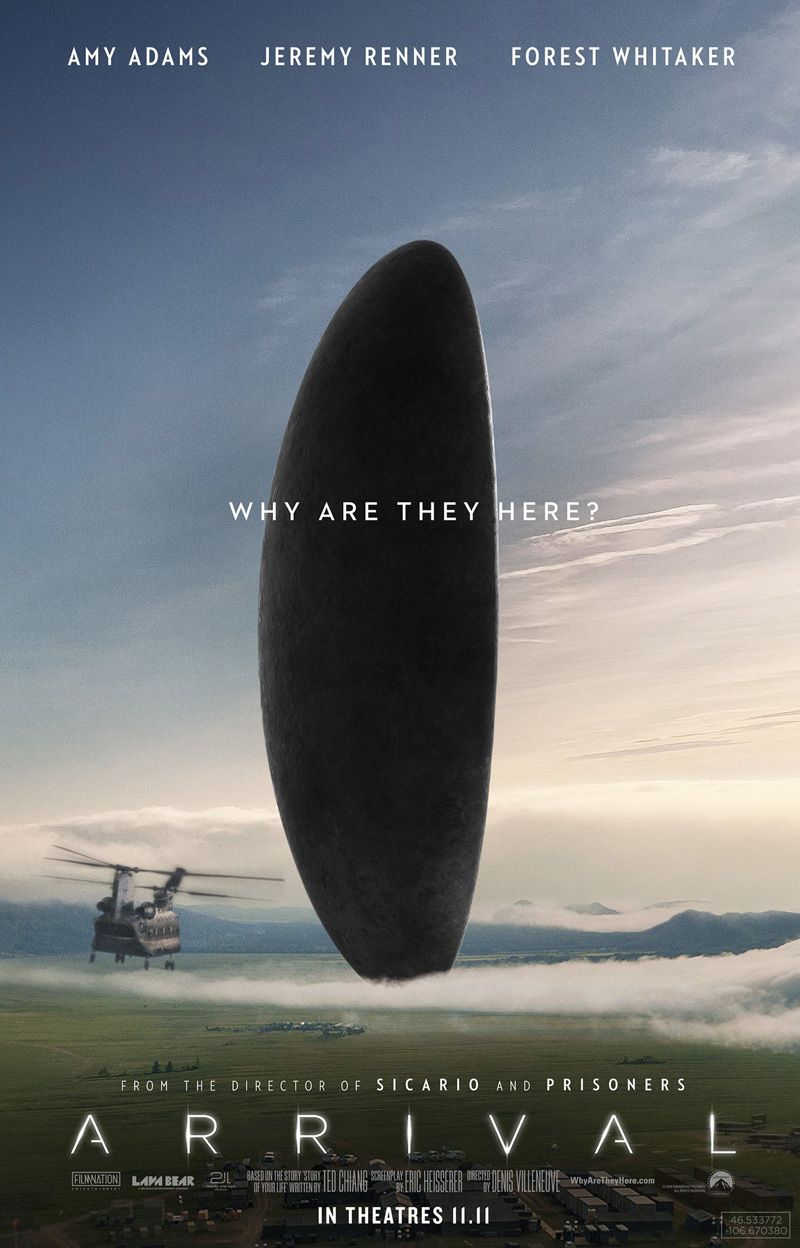Denis Villeneuve has become one of the most celebrated directors in the sci-fi genre since the release of his 2021 blockbuster epic Dune. However, an earlier movie directed by Villeneuve in 2016 may mark the real beginning of his Dune saga, according to a wild but ingenious theory originated by fans of the filmmaker’s work. Fittingly, it was his film Arrival which signaled to the world of cinema that Villeneuve had arrived as a future-great of the sci-fi genre. The movie is ostensibly a standalone story about humanity’s first encounter with aliens and their role in our future.
Yet, once you familiarize yourself with the theory that Arrival is, in fact, a prequel to Dune, it’s impossible to avoid the myriad connections between the movies, which make this theory not only plausible, but highly logical. The starting point for the theory is that both Arrival and Dune reference an intergalactic event in which humanity will play a major role, thousands of years into the future. From this point on, it becomes easier and easier to see how Dune could share a universe with Villeneuve’s earlier work, particularly in relation to the curious absence of computers in the saga.
Why There Are No Computers In Dune
Humanity Eradicated All Thinking Machines In A War
Given that Dune’s cast of characters consists of highly-developed humans living on faraway planets thousands of years into the future, it’s only natural to assume that advanced computer systems are the basis for their societies. On the contrary, there are no computers or artificial intelligence in Dune whatsoever. This apparent contradiction is explained by a religious commandment issued in the Orange Catholic Bible before the events of the franchise’s first movie, which dictates, “Thou shalt not make a machine in the likeness of a human mind.”
The reason for this commandment, strictly adhered to by all characters in the Dune universe, is the Butlerian Jihad, the intergalactic event thousands of years into the future from our present epoch, which may well connect Denis Villeneuve’s Arrival to his later movie franchise. The Butlerian Jihad is a war fought by a section of humanity to eradicate all thinking machines from the universe. The initial story of Dune takes place over 10,000 years after the Jihad ended.
How Arrival’s Alien Warning Could Connect To Dune
The Warning Could Refer To The Butlerian Jihad While Introducing Humanity To Prescience
Nevertheless, the Butlerian Jihad still occurs thousands of years into the future, which suggests it may well relate to the warning given to humanity by the aliens known as heptapods in Arrival. The heptapods arrive in Earth’s orbit at the start of Villeneuve’s 2016 movie, with a message in their own language which is eventually decoded by protagonist Louise Banks, played by Amy Adams.
The message warns of an ominous event 3,000 years into the future, which will require humanity to ally with the heptapods in order to help them. According to the Dune and Arrival shared universe theory, this event is the Butlerian Jihad, the war which leads to the necessary destruction of intelligent machines.

Related
What Happened To Earth In Dune
Max’s series Dune: Prophecy referenced humanity’s native planet Earth, raising questions as to what happened to it after humans colonized the stars.
But the heptapods’ message isn’t just a warning about this future event. It also introduces a language to humanity that fundamentally alters our perception of time, allowing those who develop an understanding of it to see into the future. This language explains the non-linear timeline in Arrival’s story. What’s even more intriguing, though, is that, according to the shared universe theory, it may mark the starting point of the cognitive development which leads to certain sections of humanity being able to see into the future in Dune.
Moreover, the theory suggests that it’s no coincidence the first human master of the heptapods’ premonitive language in Arrival is a woman. Louise Banks may, in fact, be the first ancestor of the Bene Gesserit, a female order with advanced cognitive abilities in Dune, who have a special command of language, as well as the ability to access ancestral memories and premonitions about the future.
Dune & Arrival Share Similar Themes
Both Movies Deal With Our Perception Of Time & Predestination
While the details of these shared universe themes draw out the connections between Arrival and Dune in concrete terms, there are even more fundamental similarities in the themes they share. Both Dune and Arrival deal with our perception of time, as well as the burden of knowledge prescience about the future can bring. In this sense, the messianic character Paul Atreides is closer to Louise Banks’ Dune equivalent than any female member of the Bene Gesserit sisterhood, as both Paul and Louise grapple with the unwarranted power their knowledge of the future gives them.
|
Connection |
Feature of Arrival |
Feature of Dune |
|
Future intergalactic event |
Heptapod warning about an intergalactic event involving humans 3,000 years into the future |
Begins after the intergalactic Butlerian Jihad thousands of years into the future, involving humanity’s destruction of sentient machines |
|
Human prescience |
Human consciousness is heightened by a cognitive ability to see into the future |
Humans have developed prescience about future events |
|
Ancestral memory |
The first premonitions brought about through the heptapod language are effectively memories of familial events from the future |
The people of the Bene Gesserit have developed the ability to inherit ancestral memories from previous generations of their family |
|
Female-led cognitive advances |
Louise Banks as a master of the premonitive heptapod language |
The Bene Gesserit is a female order of advanced humans with a mastery of language, memory and prescience |
|
Non-linear time perception |
The heptapods introduce the non-linear perception of time to humans for intergalactic purposes |
Spacing Guild Navigators use the non-linear perception of time for the purposes of space travel |
|
The burden of knowledge |
Louise and Ian discuss the burden of knowing the future |
The burden of knowledge about the future is a key aspect of Paul Atreides as a character |
|
Predestination |
The prescience gifted to humanity by the heptapods raises the question of predestination and determinism |
Paul’s premonitions suggest that he is predestined to lead a Jihad |
More broadly, on a wider social level, Dune and Arrival raise the idea of predestination, by depicting storylines in which the future is effectively already determined. They are rare examples of science fiction works portraying predestined events in such absolute terms, since the genre typically emphasizes humankind’s ability to shape the future, whether according to our will or by unleashing forces beyond our control.
The Problems With The Arrival & Dune Theory
Aliens Are Absent From Dune, & The Dates Don’t Add Up
Arrival serving as a prequel movie to Denis Villeneuve’s Dune franchise is certainly a compelling theory, with plenty of evidence to back it up. However, this hypothesis is far from watertight, and suffers from multiple inconsistencies that undermine its validity. For instance, Arrival’s supposed premonition of the Butlerian Jihad in the Dune universe is predicated on a super-intelligent extraterrestrial alien species warning humanity about future events. No such species appears in any part of the Dune saga, from which intelligent alien species are notably absent.
In addition, there’s a clear inconsistency between the time of the event forewarned by the heptapods in Arrival and the date of the Butlerian Jihad. In Arrival, the ominous event in which the heptapods enlist humanity’s help will take place 3,000 years in the future. But the Butlerian Jihad is said to take place 11,000 from now, even though it’s still 10,000 before the events of the first Dune movie.

Related
Dune Timeline Explained: Present To The Year 10191
Dune is set 20,000 years in the future, making it very different from many science fiction franchises. Here are the key events in its history.
The 7,000-year discrepancy between these numbers is surely too big for any Arrival–Dune shared universe theory to be able to explain away. Still, the problems with the theory don’t detract from the thematic similarities which demonstrate that Arrival unquestionably informed Denis Villeneuve’s making of Dune.

Arrival
- Release Date
-
November 10, 2016
- Runtime
-
116 Minutes

Dune
- Release Date
-
October 22, 2021
- Runtime
-
155 minutes
Source link


















Add Comment